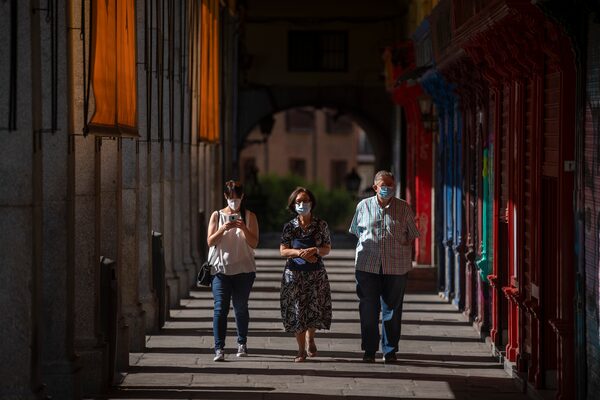Below are five events and themes likely to dominate global financial markets next week.
INFLATION PALPITATIONS

A shopper wearing a protective mask shops in a Walmart store on May 18 in Hallandale Beach, Florida.Joe Raedle/Getty Images
U.S. consumer price data out on Wednesday will provide some answers to one of the most pressing questions in world markets at the moment: How sustainable is the current surge in U.S. inflation?
Last month’s jump of 0.9 per cent was the strongest gain since June, 2008. May was pretty punchy too at 0.6 per cent and economists polled by Reuters think July’s figure won’t be far behind, at 0.5 per cent.
The Federal Reserve’s hawks are watching these figures, well, like hawks. Another hot number will bolster their case for the central bank reeling in stimulus sooner rather than later. That could cause summer squalls in the record high stock markets and the red hot bond markets.
HOLI-DAZED

Tourists visit the Plaza Mayor in downtown Madrid on Thursday, Aug. 5,Andrea Comas/The Associated Press
Back in March, Morgan Stanley predicted another lost summer for tourism, surprising some, given the vaccine optimism at the time. Now in August, when beaches and cities are normally packed with holidaymakers, their call looks bang on.
Spain welcomed 75 per cent fewer tourists last month than in June, 2019. Greek islands, billed as “COVID-free,” are coming under travel curbs again, as well as suffering wildfires. Thailand’s Phuket has just 1 per cent of the visitors it had before the pandemic. Turkey’s second-quarter tourism revenues were US$3-billion, versus US$8-billion in Q2 2019, while Kenya welcomed just 300,000 visitors in H1 compared with 2 million in 2019.
Given that tourism directly contributes 6 per cent of European GDP and nearly 8 per cent of employment, it’s unsurprising the euro zone services business expectations index has slipped to three-month lows and European travel shares have lost 13 per cent since April. The Thai baht has slumped to its lowest since 2018. It’s enough to make you need a holiday.
HEADWINDS IN ASIA

Shoppers past near advertisements for Mercedes Benz at a mall in Beijing on Thursday, July 8.Ng Han Guan/The Associated Press
Chinese data in the coming days should reveal how much damage Beijing’s regulatory crackdown, recent floods in Henan province and the new COVID-19 wave – both at home in and in nearby countries – are doing to the giant economy.
There could be contradictions. There is slowing credit growth from the crackdown on leverage and local government debt along with exports cooling after a bumper second quarter. At the same time producer price inflation will be watched to see if authorities’ attempts to quell speculation are having much impact.
Headwinds to growth have spurred calls for further cuts to reserve requirements and even possibly policy rates, both in China and its neighbourhood. Tourism-dependent Thailand’s currency is at 2018 lows forcing the Bank of Thailand to turn dovish while the Philippines might copy China’s lead on Thursday and cut its own bank reserve requirements.
COVID CLAIMS
The logo of insurer Allianz SE is seen on the company building in Puteaux at the financial and business district of La Defense near Paris on May 14, 2018.CHARLES PLATIAU/Reuters
Tried to get COVID insurance and failed? Most of Europe’s big insurers have stripped cover for the pandemic from their policies, setting them up for much stronger results than last year, when the virus caught them unawares.
France’s AXA and Italy’s Generali and Germany’s Allianz have notched good numbers already and next week sees the turn of Zurich, Dutch pair Aegon and NN and Britain’s Aviva, M&G and Prudential.
And it is not only the COVID life insurance of business claims that will be of interest. Activist investor Cevian recently grabbed a 5% stake at Aviva and Prudential is in the process of severing its U.S. arm after pressure from another corporate raider, Third Point.
ZAMBIA VOTES
Zambia's President Edgar Lungu speaks at a rally in the capital Lusaka, Zambia Jan. 19, 2015.Rogan Ward/Reuters
Zambia goes to the polls on Thursday in what looks like being a close fought election between incumbent President Edgar Lungu and serial challenger Hakainde Hichilema, known as HH.
Analysts say it is likely to be decided by young and first-time voters frustrated by an economy with the highest unemployment in 10 years and soaring living costs owing to a collapsing currency.
It is also in default. A debt restructuring has been put on hold until after the election but it is not just any restructuring. It is supposed to be the first big test of the ‘Common Framework’ debt relief plan set up by G20 countries last year. They need Zambia to be a success so that other reluctant countries follow it, so whoever wins the election will be firmly in the spotlight.
Be smart with your money. Get the latest investing insights delivered right to your inbox three times a week, with the Globe Investor newsletter. Sign up today.